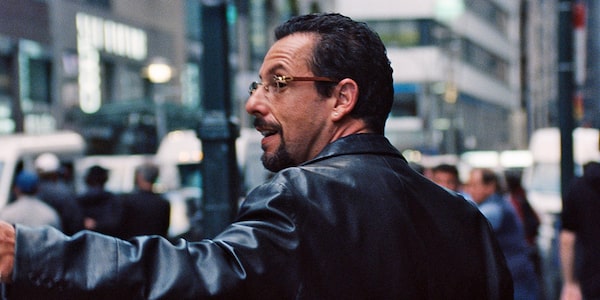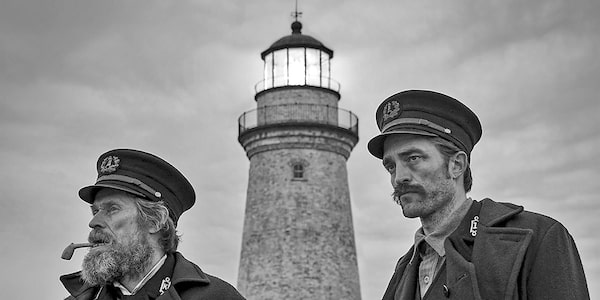
A scene from the Burnt Orange Heresy.©joseharo/Courtesy of TIFF
The 44th edition of the Toronto International Film Festival doesn’t start until Sept. 5 – and individual tickets don’t go on presale for TIFF members until Aug. 31 – but The Globe and Mail’s Arts team isn’t taking it easy. For the past few weeks, we’ve been writing down, then scratching off, our best TIFF bets – and with 245 features to choose from this year, our notepads and iPhones and ink-stained palms have been experiencing more than a bit of wear and tear. Here, members of our TIFF team each offer their most anticipated festival films.
TIFF 2019: Updated – The Globe’s latest ratings and reviews of movies screening at the festival
NATHALIE ATKINSON
The Burnt Orange Heresy: That it’s based on the lurid novel by Charles Willeford, father of the modern Miami crime novel, already meant this art-world satire was high on my must-sees. I’ll miss the sunny, seedy glamour of the original South Florida setting (it’s transposed to contemporary Italy) but the cast makes up for that. Yes, I know Mick Jagger and Donald Sutherland are in it, but it’s Elizabeth Debicki and Claes Bang that bump it up to the top.
Greed, Workforce, The Kingmaker and Made in Bangladesh: I’ve often dreamed of confronting billionaires such as Zara’s Amancio Ortega and Topshop’s Philip Green about the human cost of their fast-fashion empires, but I’ll make do with Greed from one of my favourite filmmakers, Michael Winterbottom. I have a feeling that Steve Coogan’s satire won’t just bite, it will tear my throat out. And by the time I’ve worked my way through Mexican feature debut Workforce, Lauren Greenfield’s The Kingmaker (about Imelda Marcos) and Made in Bangladesh, I’ll probably be ready to eat the rich myself.
BARRY HERTZ

In director Richard Stanley's adaptation of H.P. Lovecraft's classic horror short story, Color Out of Space, a meteor falls to earth and lands on the property of a New England family – its increasingly unhinged patriarch played by the one-and-only Nicolas Cage – with insidious, delirious, and psychedelic results.Courtesy of TIFF
Color Out of Space: Watching a Nicolas Cage film in the year of our lord 2019 is a gamble. Will I get the brilliantly gonzo Nicolas Cage who is willing to split his heart open should the script require it, à la last year’s cult-ready freak-out Mandy? Or will I get the paycheque-cashing Cage, always eager to pop in and out of some Eastern European write-off? For the actor’s latest, Color Out of Space, I’m cautiously placing a bet on the former, not only because the Midnight Madness selection is an H.P. Lovecraft adaptation – thus guaranteeing some measure of engaging delirium – but because the actor is working with South African director Richard Stanley, who seems like he can go whoa-to-whoooooa with Cage’s mad-man tendencies.
Deragh Campbell in a scene from Anne at 13,000 ft.Seth Fluker/Courtesy of TIFF
Anne at 13,000 ft.: Talk with any Canadian filmmaker under 35 – they’re not hard to find, just look for the free continental breakfasts during TIFF – and one name will come up more frequently than most: Kazik Radwanski. The Toronto director is responsible for two influential and excellent microbudget dramas focusing on outsiders (Tower and How Heavy This Hammer), and he’s set to make his biggest impression yet with Anne at 13,000 ft., debuting in this year’s Platform program. The character study, starring local favourite Deragh Campbell in the title role, promises to be Radwanski’s most refined and fully realized portrait of those teetering on society’s edge.

Uncut Gems is a crime thriller about Howard Ratner (Adam Sandler), a charismatic New York City jeweler always on the lookout for the next big score.Courtesy of TIFF
Uncut Gems: For all the evil that Adam Sandler inflicts upon the world (oh God, I just had a flashback to Netflix’s Murder Mystery and now I’m so very sad), he tends to balance it out with fascinating, yeah-that-makes-perfect-sense collaborations. Now, the man who’s worked with both Paul Thomas Anderson and, um, Frank Coraci is partnering with Josh and Benny Safdie, masters of New York grime, for the darkly comic heist film Uncut Gems. One more movie with, say, Tamara Jenkins and all will be forgiven, Sandman.
SIMON HOUPT
Incitement: Israeli writer-director Yaron Zilberman, best known for his study of messed-up string musicians A Late Quartet, teams up with Ron Leshem, creator of the HBO-adapted study of messed-up teens Euphoria, for what we expect will be a gutting study of a messed-up Israeli ultranationalist. This one is based on a true story: Zilberman looks at the radicalization of Yigal Amir, the Orthodox Jewish law student who assassinated Israeli Prime Minister Yitzhak Rabin in November, 1995, and – most dispiritingly – became a hero to many of his fellow citizens. Given our horrifying era, we’re going to go out on a limb and assume Incitement is not really just a story about Israel.
One Day in the Life of Noah Piugattuk: This latest work from Inuit filmmaker Zacharias Kunuk (Atanarjuat: The Fast Runner) had its world premiere in May in Venice, as the central installation in the Canada pavilion of the Biennale there, rather than in a cinema. Art goers – wandering types who tend to pause over a piece for a few minutes, if that – were confronted with the imperative to settle down and give themselves over to this languorous, two-hour history lesson, based on the last Inuit family that was forced in 1961 to give up their semi-nomadic existence and move into a settlement at Igloolik. Reviewing it from Venice, The Globe’s Kate Taylor declared it to have “a hypnotic real-time effect.” Time to see it in a theatre.
The Goldfinch: Hope springs eternal, when it comes to novels adapted for the big screen – usually, with underwhelming results that leave us pledging to not get fooled again. And yet here we are, fingers crossed that director John Crowley (Brooklyn) and screenwriter Peter Straughan (Tinker Tailor Soldier Spy) can wrestle Donna Tartt’s near-800-page Pulitzer Prize winner to the ground. With a cast that includes Ansel Elgort, Nicole Kidman, Finn Wolfhard and Jeffrey Wright, and cinematography by the legendary Roger Deakins, this tale of loss and longing and art theft seems a slam dunk. That’s what has us worried.
JOHANNA SCHNELLER

In the documentary There's Something in the Water, Ellen Page and fellow director Ian Daniel bring attention to the injustices and injuries caused by environmental racism of Indigenous and African Nova Scotia women fighting to protect their communities, their land and their futures.Courtesy of TIFF
There’s Something in the Water: Ellen Page is the person who taught me the term “environmental racism,” so I’m eager to see There’s Something in the Water, the documentary she directed with her Gaycation collaborator Ian Daniel. Following an urgent, disturbing study by Ingrid Waldron, Page travels to rural areas of her home province, Nova Scotia, that are plagued by toxic fallout from industrial development. She discovers that the catastrophes are deliberately pawned off onto remote, low-income and often black or Indigenous communities. I hope it’s a call to action that spurs a meaningful response in real life as well as in the cinema.
Clifton Hill: A couple of years ago, the Toronto Film Critics Association (I’m a member) gave Ontario filmmaker Albert Shin our Stella Artois Jay Scott Prize for an emerging artist, and I’m thrilled about how right we were. His second feature, In Her Place, won all kinds of accolades. Now I can’t wait to see his third, Clifton Hill, a psychological thriller about a woman (Tuppence Middleton) who returns home to Niagara Falls, where she’s supposed to settle her mother’s estate with her sister (Hannah Gross), but instead is overcome by the memory of a kidnapping she may have witnessed. It features a cameo from David Cronenberg, so I’m already shivering.
No Crying at the Dinner Table: And because I’m always on the lookout for interesting new filmmakers, I’m planning to see more short films this year. I’ve heard good things about No Crying at the Dinner Table, from Toronto director Carol Nguyen. She interviews her own Vietnamese-Canadian family to compose a complex portrait of intergenerational trauma, grief and secrets. There’s always a lot of drama in what loved ones leave unsaid.
KATE TAYLOR
Guest of Honour: Who would think of making a film about the secret life of a Canadian food inspector? Atom Egoyan of course. He returns to TIFF with Guest of Honour, a drama about an overzealous food inspector who is trying to help his wrongfully convicted daughter, except she has her own reasons for feeling she deserves punishment. The British actor David Thewlis stars as the troubled protagonist and familiar Egoyan themes beckon – the failure to protect the vulnerable; the inescapability of past trauma; the gap between public roles and private behaviour – suggesting we are in for another of the director’s chillingly understated examinations of human neurosis.
Pain and Glory: If art’s greatest theme is art, Pedro Almodovar’s new film Pain and Glory promises an intriguing insider view. Antonio Banderas won the best-actor prize at Cannes in May for playing the protagonist, an infirm and aging film director who has decided to throw in the towel, until a series of encounters with his past give him pressing new material. Part memory play – Penelope Cruz plays the director’s mother in flashbacks – part contemporary drama, the latest from the Spanish auteur sounds tantalizingly autobiographical, although he has said it is only lightly inspired by his own life.
How to Build a Girl: And speaking of tantalizing insider references, How to Build a Girl seems certain to offer critics a knowing laugh. Based on the semi-autobiographical novel by British journalist Caitlin Moran, the film takes on adolescence and media with the story of a nerdy teenager who reinvents herself as a successful rock writer by deploying relentless sarcasm and vitriol. Coky Giedroyc directs Beanie Feldstein as the working-class girl who discovers that critics are cool … but probably don’t have souls.
BRAD WHEELER

Joaquin Phoenix as Arthur Fleck in Joker.Niko Tavernise/Warner Bros. / Courtesy of TIFF
Joker: Some people call Steve Miller the Joker. For other people, it’s Heath Ledger, and there may be some Cesar Romero diehards left out there, too. From the looks of Todd Phillips’s Scorsese-inspired standalone feature on the cackling prankster, though, Joaquin Phoenix may soon own the role. He plays the Batman villain as a mentally ill failed comedian who turns to a life of crime. I can’t wait to get a load of him.

Shot on 35mm black-and-white film, The Lighthouse is a psychological thriller from Robert Eggers that follows the slow descent into madness of two lighthouse keepers (Willem Dafoe and Robert Pattinson) on a remote New England island at the turn of the 19th century.Eric Chakeen/Courtesy of TIFF
The Lighthouse: By definition, lighthouses are built to be avoided. And now a psychological thriller from Robert Eggers, shot on 35mm black-and-white film in Nova Scotia, gives even more reason to stay clear of the outposts. Willem Dafoe and a gaunt Robert Pattinson star as lighthouse keepers who slowly go mad on a remote New England island at the turn of the 19th century. The critics loved it at Cannes (and not because of Pattinson’s method-acting mustache).
Desert One: Here’s the thing about helicopters in films: They crash, like, 90 per cent of the time. King Kong swats them to pieces, and Black Hawk Down isn’t called that for nothing. Helicopters fail in real life as well, famously so in the debacle that was the unsuccessful Operation Eagle Claw rescue attempt during the 1979 Iran hostage crisis. Skilled documentarian Barbara Kopple (Miss Sharon Jones! and Harlan County, USA) tells the story of the daring but doomed American military mission.